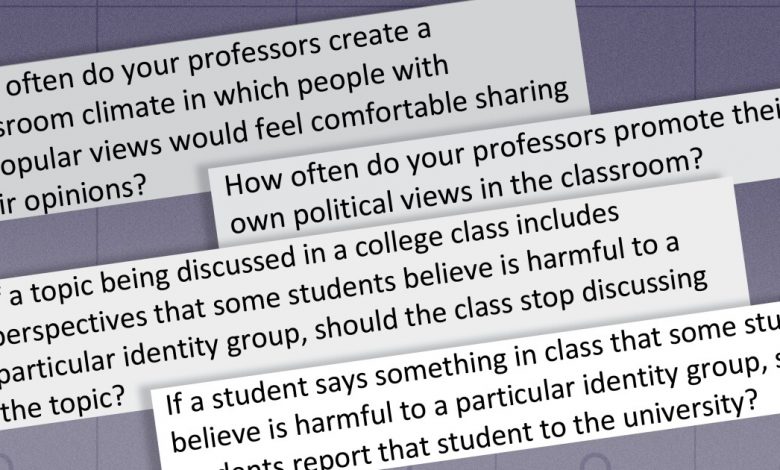U. of Wisconsin Delays Free-Speech Survey That Led One Chancellor to Quit

A controversial plan to poll students in the University of Wisconsin system about free-speech issues has been delayed until fall amid questions about whether it had bypassed institutional-approval channels. The survey, which was to have started today, sparked one campus’s leader to resign on Sunday.
In an email to system administrators on Wednesday afternoon, Timothy Shiell, the director of the center funding the survey, wrote that the pause “will enable us to answer fully and accurately the avalanche of questions arising and lay the groundwork for a successful survey.” Shiell was not immediately available to comment.
Student leaders on five of the system’s campuses — Eau Claire, La Crosse, Madison, Stevens Point, and Whitewater — had called on the system to delay or cancel the survey. Davin R. Stavroplos, president of Whitewater’s student body, wrote in an email to The Chronicle that the delay marked “a great win for students.
“I hope the UW System decides against releasing this survey next semester, and as always, if a student has concerns about their ability to freely exercise their speech in the classroom, they should immediately get in touch with their administrators and their student government association. That is how we properly address these issues,” Stavroplos said.
This week, James P. Henderson, Whitewater’s interim chancellor, resigned after he and other chancellors had expressed reservations about the process by which the decision to administer the survey was being determined. “Given the events of the past week,” Henderson wrote in his resignation letter, “I don’t feel that I can continue as interim chancellor at UW-Whitewater.” (A call to Henderson on Thursday morning was not immediately returned.)
Henderson and other chancellors had raised concerns about the survey in a meeting with the system’s interim president, Michael J. Falbo, a couple of weeks ago. At that time, Falbo said in a statement on Tuesday, he told the Menard Center that the system wouldn’t participate. But Shiell, the center’s director and the survey’s primary investigator, asked the system for a justification of that decision, writing in an email to Falbo and others that “while we certainly value the opinions of the chancellors on this topic, we are concerned their judgments are based on incomplete and perhaps mistaken information regarding the survey.” The survey appeared to be on track to move ahead.
‘Politically charged’
Like a similarly controversial survey being conducted in Florida, Wisconsin’s Student Perceptions of Campus Free Speech Survey includes questions about topics such as viewpoint diversity and whether students have felt pressured by professors to agree with a specific political or ideological opinion discussed in class. It also poses hypothetical scenarios, asking whether students believe those scenarios would be protected under the First Amendment. Survey respondents would also be asked what political party and ideologies they most identify with. Funded by the Menard Center for the Study of Institutions and Innovation, which is based at the system’s Stout campus, it is to be conducted by the Wisconsin Institute for Public Policy and Service, a unit of the system.
The survey’s subject matter, and the Menard Center’s affiliation, had prompted concerns for some. (The Menard Center, while nonpartisan, is funded by the conservative Menard family, owners of the home-improvement store chain Menards.) Some in the system have expressed concerns that the survey’s results could be misused by Republican legislators.
“Because this is such a politically charged topic, a lot of people are making unfounded assumptions. They see the Menard name on our center and they assume we have a conservative or libertarian agenda when we don’t,” Shiell, a professor in the English, philosophy, and communication-studies department on the Stout campus, told The Chronicle on Tuesday. “People are worried maybe the results will be bad, and legislators will use that as ammunition to do something bad to the system. There’s a lot of fear and a lot of assumptions, and sometimes that’s interfering with people’s thoughts about the survey.”
Nick Fleisher, the president of the American Association of University Professors’ Wisconsin chapter and an associate professor of linguistics at the Milwaukee campus, opposes the survey for precisely that reason.
“It’s good that the survey has been delayed, given the major questions that have been raised about the process behind it. But the legislature has now revealed its hand,” Fleisher wrote to The Chronicle. “Legislators are not approaching this survey with disinterested scientific curiosity. Their intense interest in it suggests that they already have plans for how to use its results, whatever they may turn out to be.” Regardless of the researchers’ intent in conducting the survey, Fleisher said, it will likely be used as fodder to attack the university system. “It has already cost us one chancellor.”
At least one state legislator, Representative Dave Murphy, has gotten involved in the survey. Murphy, a Republican, told Wisconsin Public Radio that he and other lawmakers pushed back after learning that the chancellors had objected.
Proper Research Review?
A key point of contention is whether the survey had been approved by the institutional-review boards on each of the system’s 13 campuses. The system office had cited the apparent approval of the IRBs to reassure the chancellors that the survey could move forward. Falbo said on Tuesday that he’d decided to go ahead with the survey in part because “the universities’ own institutional review boards had approved it as a research issue.”
But, after Falbo’s assertion was published, questions emerged about whether such approvals had, in fact, been granted. In a second statement, provided to The Chronicle on Wednesday, Eric Giordano, executive director of the Wisconsin Institute for Public Policy and Service, which was to conduct the survey, said that “the IRB process was followed to the letter.”
Although the statement noted that the Whitewater campus had not given IRB approval, it described Shiell’s team as having received approval from the Stout campus’s IRB, after which, according to Giordano, “every other university IRB committee was contacted by the research team.”
On Wednesday, one campus IRB chair indicated that wasn’t the case.
“This is the first that I am aware of this survey,” Illene N. Cupit, the chair of the Green Bay campus’s IRB, wrote in an email to The Chronicle on Wednesday, after the system had already announced the survey. “If there is a survey circulating on campus without IRB approval that would be in violation of our IRB policies. Thanks for the alert, but currently it is out of my hands unless I see a survey going around.”
But on Wednesday evening, Cupit said she’d misspoken. The Stout campus, she wrote, had “sent us a request for outside institutional access to our students for the survey to which you refer.” She went on to describe the ensuing process. “We had a full board meeting to discuss their protocol and survey and granted them permission to do the survey. They were following federal ethical guidelines and our institution’s IRB policies.” A request for the minutes from the Green Bay IRB meeting and related documents was forwarded to the campus’s records custodian.
Some of the IRB committees determined that the survey didn’t qualify as human-subjects research and that it would be forwarded to another department on campus for approval, Giordano said. Most, though, had accepted the Stout approval — in some cases, campuses in the Wisconsin system can rely on the determinations made by the IRBs of other campuses — and granted an exemption from full review, copies of which the system provided to The Chronicle. The Whitewater campus, where the interim chancellor resigned, “had suggested delaying IRB approval pending an administrative decision of whether or not to allow students to participate in the survey,” Giordano wrote.
Source link






